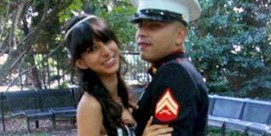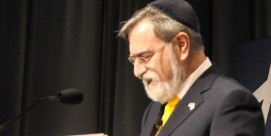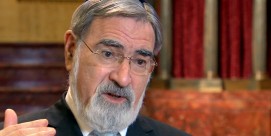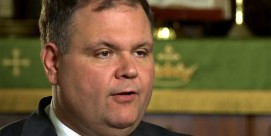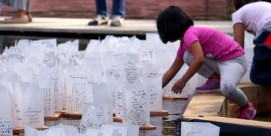Harold Dean Trulear: Moving Through Darkness
For those of us interested in the intersection of religion, ethics, and politics, President Obama’s recent address to the nation on the end of combat operations in Iraq offered several interesting moral judgments.
One was “a belief that out of the ashes of war, a new beginning could be born in this cradle of civilization,” suggesting that war can have a purpose despite its awfulness and reflecting Obama’s ongoing optimism about the human condition.
The president invoked notions of peace, both a “lasting peace” for Americans and a peace beyond the current conflict in the Middle East, though “peace” was never defined. He spoke of the “billions of young people [who] want to move beyond the shackles of poverty and conflict,” and I am assuming he included those of inner-city America, but I can’t be sure. He exhorted us to take responsibility for disabled veterans in a call that rivaled any we have heard since the 1940s and 1950s, and he made a virtue of our accountability for those who represent us in military combat.

The president also asserted that war is “the darkest of human creations,” and here I heard a contestable statement that could invite challenges from those who might seek to nominate experiences other than war. A quick Google search reveals quotations attributing such ultimate darkness to American slavery, child and domestic abuse, rape, the Holocaust, genocide, and torture. I would hesitate to assign “darkest” status to war or any of these horrors.
The use of the term “creation” to describe something so admittedly dark as war raises questions about human nature and the human spirit. The language certainly represents a leap from the positive view of humanity that normally characterizes Obama’s oratory and vision. The human capacity for evil comes in many incarnations, and we have had presidential assertions of such a reality before, often attached to an “axis.” It seemed paradoxical coming from this president for whom hope has defined much of his campaign and administration. If he truly means humans created the darkness of war, how can he be so certain of better days ahead, especially given our continuing presence in Afghanistan and the fact that both Iraq and Afghanistan represent millennia of conflict?
In the past, successfully navigating the darkness of war came with a clear sense of victory for one side or the other. But the president told us we live “in an age without surrender ceremonies.” So how do we move through the darkness if we have no ritual to signify the significance of this moment, except for a presidential address? Is the president now also a high priest who speaks ex cathedra from the holy of holies, the Oval Office, to our darkened souls? No ritual of celebration—just a word from on high? That is not the president’s fault. It speaks more to the changes in our world and our need to find other ways to be sustained in times of darkness.
Might religion, not politics, offer a more proper navigation tool? Religion restrains our declarations of “peace when there is no peace,” as the Hebrew prophets said. It celebrates as victory a people’s veritable endurance of darkness. But while prophets are rare, we have priests in abundance, few of whom can give us the categories we really need to think about war and peace. We feel the absence of a prophetic voice in the public square, yet I don’t think we would allow a president to exercise such a voice. The priestly function of the office is one we have created.
There are few prophets out there, yet all of our religious traditions have a prophetic dimension to them. The prophetic tradition moves beyond the self-interests of the prophet’s community (Blacks for Blacks, Jews for Jews, etc.) to point to a higher ideal for the Creator’s bright creation and its persistence through the darkness of human creations. Recent “friendly fire” from Black prophets and overt criticism from Tea Party voices fall short here. The best of the prophetic tradition transcends self and tribal interest and points beyond any particularist blessings—American, Black, Republican, or otherwise—to look to a transcendent principle against which to measure our aims.
The priestly presidential office cannot offer this. Prophetic religion can. Hebrew prophets held their measuring sticks to Israel and Egypt, Jew and Babylonian. Martin Luther King sought a community that included the poor, both domestic and foreign. Islamic pilgrimage crosses race and ethnicity.
Have our religious traditions become “non-prophet” organizations led by tribal priests? Who will play Nathan to the nations? Who will say to all who usurp and clamor for the power that war provides: “Thou art the one”?
Harold Dean Trulear is associate professor of applied theology at Howard University in Washington, DC.

